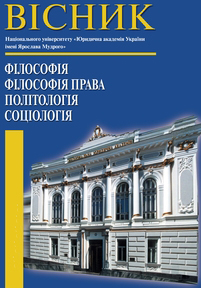РОЛЬ ЗАСОБІВ МАСОВОЇ КОМУНІКАЦІЇ У РОЗВИТКУ ІНФОРМАЦІЙНОЇ КУЛЬТУРИ ВІТЧИЗНЯНОГО СОЦІУМУ В УМОВАХ «ГІБРИДНОЇ ВІЙНИ»
THE ROLE OF MASS COMMUNICATION IN DEVELOPMENT OF INFORMATION CULTURE OF THE DOMESTIC SOCIETY IN THE CONDITIONS OF «HYBRID WAR»
Author(s): Olena Viktorivna PrudnykovaSubject(s): Media studies
Published by: Національний юридичний університет імені Ярослава Мудрого
Keywords: mass media communications; information space; «hybrid war»; information aggression; values;
Summary/Abstract: Problem setting. Mass media communications (hereinafter – MMC) play a special role in the formation of the information culture of society, they retransmit and affirm certain values (anti-values), norms, stereotypes of thinking and behavior. In the conditions of the«hybrid war» in Ukraine, MMC become «weapons» for the struggle for national interests, an important tool for raising the information culture of citizens. In the domestic society, powerful MMC belong to financial and industrial groups, reflecting their political and economic interests, which unfortunately may not coincide with the national ones. Mass media communication play a role in the implementation of state information policy and its information security, because of this, the ideological (party) direction of the media becomes strategic in protecting national information interests.Recent research and publications analysis. Problems of the impact of MMC on the information culture of society, the peculiarities of interaction between the state and society, the role of the media in the «hybrid war» etc. from different angles are represented in the scientific works of such researchers as V. Vakulich, T. Vlasenko, D. Gallin, V. Gurkovsky,I. Lubkovich, P. Manchini, L. Smola, V. Stroyanovsky and others. At the same time, the aforementioned problems in the scientific literature did not become complex.Paper objective. In our research, we aim at comprehensive analysis of the problem of the impact of MMC on the formation of the information culture of Ukrainian society in a «hybrid war».Paper main body. For developing the information culture of any democratic society, it is important to establish clear rules for the interaction of state institutions and mass media, to determine the basic parameters of the existence of the country’s media landscape. MMC as the basic subjects of information security and the creators of the information culture of Ukraine, in the conditions of the «hybrid war» should take care of national interests: in its informational and educational activities to promote democratic values, promote the unity of the Ukrainian people, abandon the technologies of opposition and41 Вісник Національного університету «Юридична академія України імені Ярослава Мудрого» № 1 (36) 2018split of various social groups, ethnic and religious formations in the domestic society. In turn, media owners, parties and their leaders must realize their responsibility to protect national interests, including in the information and cultural sphere, to participate constructively in the formation and implementation of information policy of the state, cultural and educational events.From our point of view, while investigating the problem of the transformation of the information culture of Ukrainian citizens under the influence of the «hybrid war», special attention should be paid to the analysis of the activities of Internet-entities that actively participated in the struggle for informational sovereignty of Ukraine. In this regard, it should be noted that the scientific literature uses the concept of «converged media», which denotes various forms of electronic communication, based on the use of computer technology.Conclusions of the research. Concluding the description of the role and place of the MMC in shaping the information culture of Ukrainian society in the conditions of the«hybrid war», it should be noted that this process is due to a number of institutional and non-institutional factors. In particular, the progressive development of the informational culture of Ukrainian society is determined by the ability of the state and civil society institutions to withstand information aggression against Ukraine, due provision of information and communication activities and the moral and ethical level of all subjects of the informational and cultural space of our state.
Journal: Вісник НЮУ імені Ярослава Мудрого. Серія: Філософія, філософія права, політологія, соціологія
- Issue Year: 36/2018
- Issue No: 1
- Page Range: 33-42
- Page Count: 10
- Language: Ukrainian

